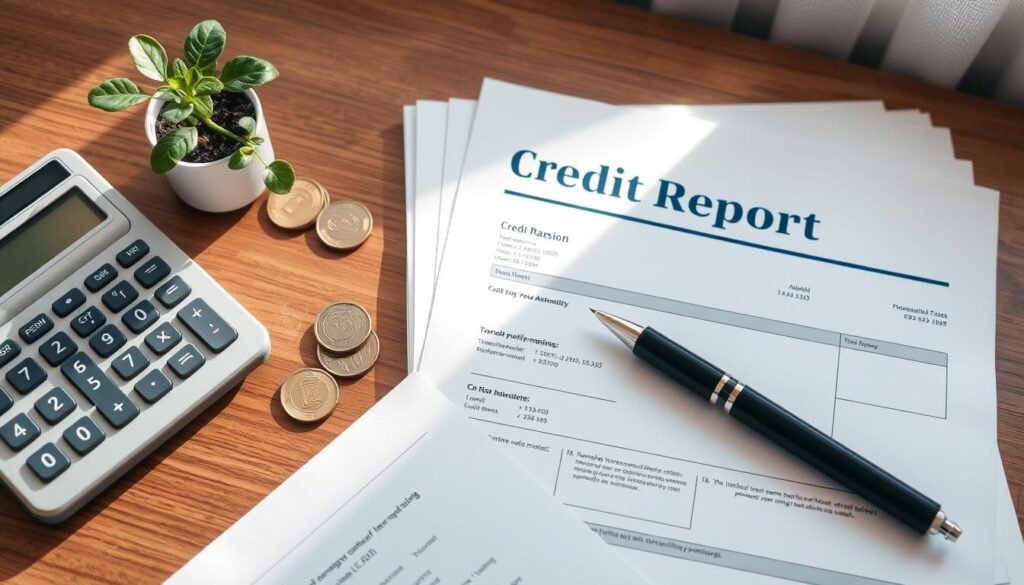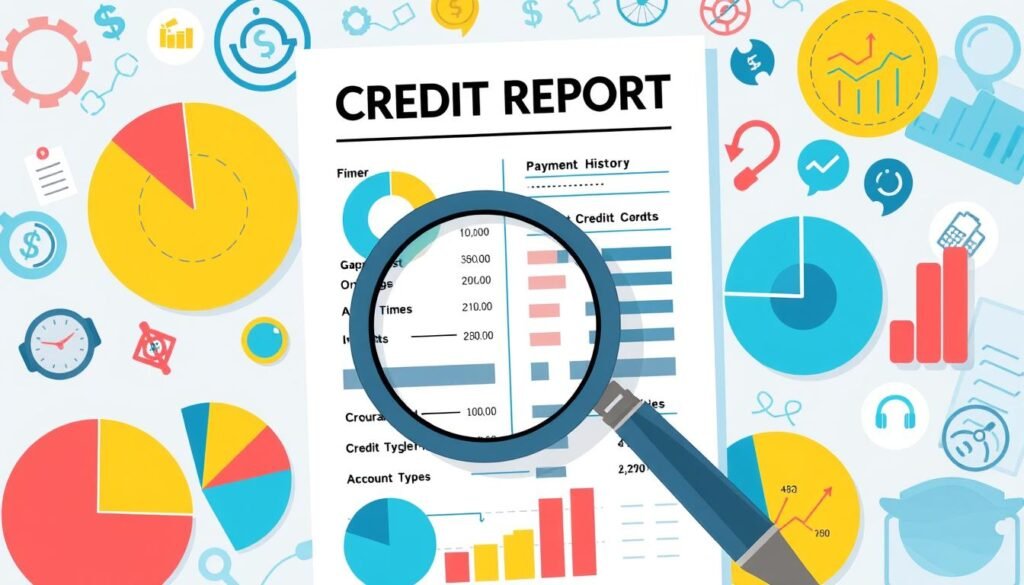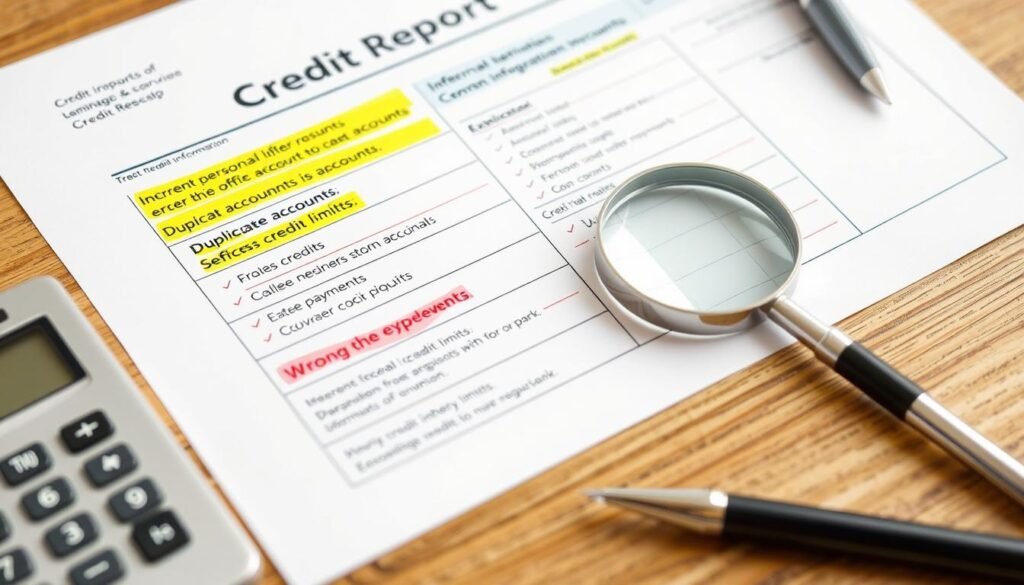This post may contain affiliate links, which means I may earn a commission if you purchase through these links at no extra cost to you.
As a realtor, I’ve seen firsthand how heartbreaking it can be for a client, or even for myself, to be fully prepared to buy a dream home, only to be denied because of errors on a credit report. I’ve experienced it too. After years of saving and planning, being told “no” due to inaccurate info on my report was frustrating. But I learned that I had the right to fix those mistakes, and that knowledge changed everything. Now, I make sure my clients know it too.
Table of Contents
ToggleUnderstanding Common Credit Report Errors
Knowing common credit report mistakes is key because they can really hurt your finances. Working to fix these errors helps keep your financial health strong. It can stop bad outcomes like loan rejections and too-high interest rates.
Impact of Credit Report Errors
Mistakes on your credit report can mess up your financial plans. You might find issues like wrong identities, account errors, or incorrect statuses. These mistakes often come from creditor mistakes, human error, or fraud. Fixing these fast is crucial for your financial needs.

Report errors can make it seem like you owe more, raising your interest costs. Wrongly listed accounts can confuse lenders. This may lead to worse loan conditions or no loans at all.
Did you know job offers can be withdrawn because of your credit report? Employers must get your okay before looking at your report. That’s why it’s vital to challenge any errors you find.
According to the Federal Trade Commission, 1 in 5 people have a mistake on their credit report. The Fair Credit Reporting Act lets you get a free report yearly to check for mistakes. Errors can also mean you pay more for insurance because of the perceived risk.
Here’s how credit report mistakes can affect you:
| Consequence | Impact |
|---|---|
| Higher Interest Rates | Errors can increase your debt ratio, leading to more in interest. |
| Loan Denials | Mistakes might stop you from getting financial assistance or a mortgage. |
| Insurance Premiums | Errors can up your premiums for car and home insurance. |
| Employment | Bad reports may cause job application denials. |
It’s key to watch your credit report and fix any mistakes. The law says credit agencies must answer to your disputes in 30 days. So, regularly check your credit to stay on top of it and secure better financial deals.
The Most Common Credit Report Errors
Errors in your credit report can deeply affect your finances. A study by the Federal Trade Commission shows about 20% of reports have big errors. These errors can make your interest rates go up and cause other financial issues.
Incorrect Accounts
Wrong accounts on your report are a big problem. They may happen because of identity theft or mistakes. Accounts that you’ve paid off but still show as due often cause trouble. Credit card companies, banks, and auto lenders usually make these errors. There were over 167,000 reported cases of fake credit card accounts in 2018. It shows how important it is to watch for wrong info on your report.

Inaccurate Personal Information
Mistakes with your name, address, or Social Security number happen too. Sometimes your info gets mixed up with someone else’s, which is bad. In the worst cases, your report could wrongly say you are dead. To fix these errors, you often need to challenge them with credit bureaus. In cases of identity theft, you might also need a police report.
Account Reporting Mistakes
Errors in financial data are also common. These include wrong balances, payment history, and account status. Accounts older than seven years shouldn’t be on your report. But there are exceptions for judgments or bankruptcies, staying up to ten years. Wrongly marked accounts, like an open account marked closed, can unfairly lower your credit score. Such errors can lead to you paying more for insurance, utility deposits, and can affect your job chances.
Here’s a quick list of how credit report errors can hurt you:
| Type of Error | Potential Impact |
|---|---|
| Incorrect Accounts | Increased interest rates, difficulty obtaining loans |
| Inaccurate Personal Information | Mixed credit files, mistaken identity, extensive financial damage |
| Account Reporting Mistakes | Higher insurance premiums, job loss, higher utility deposits |
To protect your financial health, know about these errors. Check your reports from Equifax, Experian, and TransUnion regularly. It helps you find and fix mistakes before they get worse.
How Common Credit Report Errors Affect Your Credit Score
Errors in credit reports can deeply impact your credit score. Mistakes like wrong balances or accounts you don’t recognize can mislead lenders. They think you use more credit than you really do.

Increased Credit Utilization Rate
Inaccuracies in your report can inflate your credit utilization rate. This looks like you’re using a lot of your credit limit. Lenders might see this as you being a higher financial risk.
It’s key to know how to fix credit report errors. Check your reports often. This lets you spot and fix mistakes quickly. A correct report shows your true financial situation.
False Delinquency
False delinquency is a harmful error. It happens when on-time payments are wrongly marked as late. This error can make you appear less trustworthy to lenders. You might face higher interest rates or get denied for loans.
You can challenge these mistakes through the credit report dispute process. When you dispute, you tell the credit bureaus and creditors about the mistakes. You also send them proof. This is crucial for a fair credit report.
Complaints about credit report errors to the Consumer Financial Protection Bureau (CFPB) have skyrocketed. They went from about 308,000 in 2021 to nearly 645,000 in 2023. This shows checking your credit regularly is important. Catching and fixing errors can improve your financial path.
| Credit Report Error | Impact |
|---|---|
| Incorrect Accounts | Misleading information about credit usage and habits |
| Inaccurate Personal Information | Potential identity verification issues, impacting credit applications |
| Account Reporting Mistakes | False delinquency, affecting creditworthiness |
By learning how to fix credit report errors through disputes, you protect your financial health. This makes getting loans easier. You’ll likely secure lower interest rates and more financial opportunities.
Steps to Dispute and Rectify Errors on Your Credit Report
Making sure your credit report is correct is key to having a good credit score. This guide will show you how to fix mistakes on your report.
Requesting Your Credit Report
You can get a free credit report yearly from Experian, Equifax, and TransUnion. Currently, these bureaus offer free weekly reports until 2026. This helps you keep an eye on your credit for any wrong info.
To get your report, visit the bureau’s websites or call: Equifax at (866) 349-5191, Experian at (888) 397-3742, and TransUnion at (800) 916-8800. From 2015 to 2020, many people found mistakes on their reports. So, it’s vital to check yours closely.
Filing a Dispute
If you find errors, file a dispute right away. Each bureau has its way to submit disputes. Experian takes disputes online, while others may need mail. Give all proof to back up your dispute. Bureaus must check your dispute in 30 days and tell you the result in five days.
Follow Up
Keep on top of your dispute to make sure it’s fixed. Bureaus must tell people who got your report in the last six months about any corrections. They also need to inform those who requested it for jobs in the past two years.
If your dispute isn’t resolved to your liking, you can add a statement to your report. This lets future lenders see your point of view. Fixing wrong info can boost your score, like removing late payments or false accounts.
It’s crucial to keep your personal info up to date on your credit report. But, changes to your details don’t always affect your score, unless they mistakenly link you to someone else’s account.
Preventing Credit Report Errors in the Future
Keeping your credit report error-free is key. By being watchful, you can dodge errors that hurt your credit score. Here, we spell out how to stop such mistakes before they happen.
Credit Monitoring Services
One top way to keep errors off your credit report is using credit monitoring services. They send alerts when there’s a change or possible fraud. This means you can act fast on any strange activity. Reports show users of these services saw a 24% jump in fraud alerts, showing it pays to be alert.
Regular Checks
Checking your credit report often is vital. Data shows checking your credit yearly makes it 13% more likely to be accurate. Since 1 in 5 people have errors on their reports, checking regularly is a must. Using tools from credit bureaus can help you spot and correct errors quickly.
Knowing the common mistakes and how to fix them helps keep your score high. Don’t let errors hurt your financial future. Start a routine of checking your credit, and use monitoring services for an up-to-date report.
The Legal Framework and Your Rights
Knowing the laws on credit reporting helps when you spot mistakes on your report. The Fair Credit Reporting Act (FCRA) gives you the right to a correct credit report. Credit bureaus must check and fix errors in 30 days unless they think your dispute doesn’t matter.
You get one free credit report every year from each big credit bureau thanks to the FCRA. If your report has caused you problems, or if think you’re a fraud victim, you can get another free report. Always check your credit reports to find errors and act fast to fix them.
When fixing report errors, bad info can’t stay on your report for more than seven years. Bankruptcies are a bit different, staying up to ten years. Putting a security freeze on your report might help, but it could slow down new credit approvals. You must okay any sharing of your credit info.
If credit agencies don’t hear back within 30 days on a dispute, they must delete the disputed info. They can’t share old, bad info about you. Adding a fraud alert to your report gives you seven years of extra protection from identity theft.
You can also ask for your dispute to be noted in your report. This is crucial if you need to take legal steps later. A study found about 21% of people found mistakes on their reports. And for about 13%, these mistakes affected their credit scores.
Final Thoughts
Maintaining your financial credibility requires knowing how to fix credit report errors. It’s crucial to recognize and correct mistakes like incorrect accounts and personal information errors. The Federal Trade Commission (FTC) reports that 20% of consumers find errors on their credit reports. Hence, identifying and disputing these inaccuracies is key to ensuring your credit score truly reflects your financial behavior.
Checking your credit reports annually helps prevent future problems. Many don’t know they can get a free report yearly from Equifax, Experian, and TransUnion. This practice helps you spot and amend errors such as mixed files or outdated info. For extra security, consider credit monitoring services to stay alert to any suspicious changes or activities.
It’s also crucial to know your legal rights regarding credit reporting. Credit bureaus must look into disputes within 30 to 45 days. Yet, 70% of issues remain unresolved due to consumers not following up. Always keep track of your disputes. Being informed and proactive about your credit report leads to smarter financial choices and serenity.



